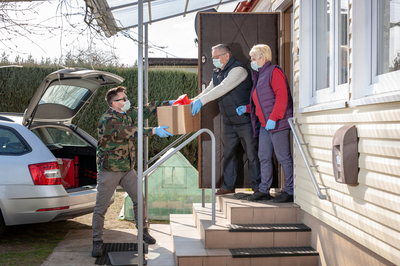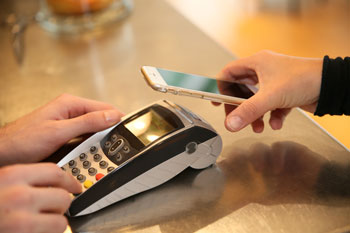SEMA News—July 2020
BUSINESS
(Re)Open For Business
Three Brand-Management Strategies to Survive COVID-19 and Come Out Stronger
 Consumers expect the business community to assume a leadership role in the fight against COVID-19, so proactive support for community initiatives outside the traditional business scope can be a big help to promote and expand your brand in the short term. |
The COVID-19 pandemic caused many companies to scale back production or reduce operating hours, and it’s clear that consumers are looking for greater safety and security in their lives as the industry moves toward recovery. Based on information gathered from a variety of sources, the consensus is that the companies that are best positioned to deliver those attributes while still reliably delivering the products and services their customers depend on will have a unique opportunity to build upon and even expand their brand awareness in the coming years.
That will require many companies to make adjustments—some minor, others substantial—to their current business models and develop marketing communications initiatives that offer assurance and affirmation as well as motivation and engagement.
One data point, a market-research survey of 2,200 adult Americans conducted in late March and published by global technology company Morning Consult suggested that large majorities of consumers are forgiving of businesses in the face of the virus, with 87% expressing appreciation for companies that have remained open for business. But they also expect the business community to take a leadership role in combatting the pandemic, with 68% expressing the belief that company CEOs bear some responsibility for helping Americans during
the crisis.
 With so many potential customers quarantined, there has never been a better time for companies to expand their online presence with aggressive use of social media. Facebook, Instagram and YouTube are all efficient and economical ways to stay in touch with your customers when they can’t interact with you. |
Tip: Take Note of Consumer Preferences and Tailor Your Business Accordingly
According to the Morning Consult survey, consumers show a strong preference to buy from companies that provide a “clean and safe” store environment (88%). This is one action point that many companies have already begun to ramp up in their workplaces by accelerating daily and hourly cleaning schedules, making hand sanitizer and related cleaning products more widely available to customers and employees, and by offering curbside service where in-store shopping has been curtailed or is not advisable.
As an example, Pep Boys recently rolled out a new repair and installation protocol where customers can book appointments online, drop off their vehicles, pay for services via smartphone and pick up their vehicles, all without the need for any close human contact. 4 Wheel Parts, among others, has recently introduced curbside service at its retail locations. Additionally, environmental service companies such as U.S. Ecology (www.usecology.com) are among those becoming more visible to provide cleaning and decontamination instructions to aftermarket companies looking to optimize workplace sanitation.
The survey also showed a strong consumer preference for companies that treat their employees with “flexibility and empathy” (84%). This is another area where many aftermarket companies have been proactive, expanding work-from-home policies and creating greater safeguards in the workplace. Summit Racing, to name one, announced recently that it will begin requiring masks to be worn at its facilities, in addition to implementing greater physical spacing between work stations, and many aftermarket companies such as Derive Systems and Painless Performance have instituted telecommuting protocols.
Tom Shay, an author and small-business consultant, encouraged companies to reconsider how they engage with their customers.
“It’s a different game now,” he said. “The old item-and-price advertising with the list of ‘here’s our weekly specials’ isn’t going to work because that’s not what people are interested in. People are buying things that help them feel normal. They’re feeling out of control, and some of the panic buying we’re seeing is a reflection of that. There’s a great opportunity to connect with people, to help them feel good about your business and to keep your name in front of them so that you’ll be remembered when the world comes back to normal.”
By contrast, he said, “the people who went to shut-down mode to a large degree have got to start all over with building their name from ground zero.”
 As more sales are generated online, it’s a good idea for companies to be flexible in offering multiple payment options for consumers. PayPal, Apple Pay and Amazon Pay should be considered as essential going forward in addition to traditional credit and debit cards. |
Tip: Consider the Future Consequences of Decisions Made Today
This can be a difficult subject, particularly in a business climate in which layoffs, furloughs or reduced business hours may be unavoidable. While consumers are overwhelmingly sympathetic as companies adjust their operations, actions such as layoffs, besides being disruptive, can lead to poor business outcomes. Nearly half of all Americans surveyed by Morning Consult said that they were less likely to patronize a business that had imposed layoffs, so how companies respond to this negative public perception can make a considerable difference not only to the minds of consumers but also to the bottom line.
According to the Morning Consult survey, among the actions that companies can take to strengthen consumer loyalty are pledges to rehire workers after business improves (64% responded favorably), announcing salary reductions for the executive management team (63%), and issuing public statements explaining the reasons behind the layoffs while expressing continued support for laid-off employees (62%). Shay advised against layoffs if at all possible.
“As an employer, if you’ve got the money, you have to look at how much time you invested in that employee to teach them what they know about the automotive industry,” he said. “If you simply toss them out the door and say, ‘I’m sorry, but I have to lay you off at this point,’ how do you think you build that experience back into your business?”
Shay instead advised companies to consider taking advantage of new federal relief initiatives such as the Paycheck Protection Program (PPP), a Small Business Administration (SBA) program that guarantees loans for small businesses up to 250% of a company’s monthly payroll (up to $10 million), which can be used to cover payroll, mortgage, rent and other specified expenses. PPP loans offer favorable terms (1% interest), and the SBA will forgive portions of the loan used to cover payroll, mortgage interest, rent and utilities for the first eight weeks if small businesses retain their employees and payroll levels.
Shay also pointed out that programs such as PPP provide companies with an opportunity to leverage their workforce to perform valuable community service.
“You don’t have to have your employees actually working; you just have to keep them on the payroll,” he noted. “So if you don’t have anything for your employees to do, you could assign them to volunteer at a local charity such as a food bank that’s feeding low-income children: ‘I don’t have anything for you to do here, so this is where I’m assigning you today.’”
To that end, many companies have responded by launching community-service programs, and consumers have noticed, according to the Morning Consult survey. As an example, 38% of Americans said that they would be more likely to patronize Wal-Mart after the company announced it would conduct drive-through coronavirus testing at some of its locations. A similar percentage said they would be more likely to purchase products from Apple after the company announced it was donating nine million face masks to support hospital relief efforts; 36% said they were more likely to purchase from Anheuser-Busch after the brewer announced it was shifting production lines to make hand sanitizer; and 45% said they’d be more likely to buy from Kraft-Heinz after the company announced that it was donating $12 million in cash and products to virus-impacted communities.
In a similar vein, numerous SEMA-member companies have retooled their operations or partnered with other companies to provide goods and services outside their core competencies to address the coronavirus pandemic—and discovered potential new revenue streams in so doing.
Case in point is Graffiti Shield, a company based in Anaheim, California, that manufactures graffiti-proof protective film products. The company saw a steep decline in business in the weeks following the initial COVID-19 outbreak, but then it was approached by a local hospital that was having trouble sourcing clear face shields for its medical staff. Within a matter of hours, the company had devised the means to design and cut shields that could be secured to the wearer’s head with Velcro straps.
“The main reason we took the project on—besides helping the hospital—was that we didn’t want to furlough any of our people,” said company CEO Jeff Green.
The company initially produced 1,000 shields a day, but production was soon tripled as new orders came in, and additional workers have been hired to meet
the demand.
Shay summed it up: “In the short term, the questions you need to be asking are: What can you do for your employees? What can you do to stay in touch with your customers? And what can you do to help your community?”
Tip: Invest in Quality Service and Acknowledge Customer Support
It’s one thing to make those changes in the workplace, but it’s equally important to communicate those facts in ways that will resonate with the public. According to Morning Consult, consumers respond most favorably to messaging that shows (a) what companies are doing to help stop the spread of the coronavirus and (b) what companies are doing to improve their customers’ safety and overall
well-being.
“It’s all about customer service,” Shay said. “A good message for employers is to emphasize customer service at this point more than ever.”
But customer service requires more than a nod and a wave at the door. It requires an educated workforce and a company willing to provide ongoing education.
“When I’m speaking at the SEMA Show,” Shay explained. “I’ll ask this question with a show of hands: ‘How many of you believe that you give great customer service?’ And the majority of hands go up. Okay, so I ask a second question: ‘How many of you have an ongoing program where you teach people how to engage with customers, how to sell merchandise, and where you teach about the products and the differences between various products?’ Very few hands go up. My question then is, ‘How do you expect me to believe your first answer when I’ve heard your second answer?’”
Shay also advised companies to consider expanding payment methods to provide greater flexibility to customers. In the short term, he said, “You’re going to find people who don’t want to touch cash, so I’d ask every businessperson: ‘How many different ways can I pay you? Visa, MasterCard, is that it?’ For a lot of folks, the answer is yes. But you also need to look at American Express and Discover. Then look at Apple Pay, Amazon Pay, Google Pay, Samsung Pay. You’ve got to open up.”
| Sources | |
| Tom Shay is a fourth-generation business owner and has been writing about small-business issues for more than 30 years. He is the author of 13 books and has been published in dozens of industry trade publications. His company, Profits Plus Solutions, advises small businesses on management, staffing, business strategy and financial planning. He can be reached online through his website, www.profitsplus.org. Morning Consult is a global technology company that collects, organizes and shares survey research data. The company’s website is www.morningconsult.com, and its email address is contact@morningconsult.com. |
In the end, Shay said, customer service begins with keeping customers engaged. When so many are quarantined, social-media sites such as Facebook, YouTube and Instagram are ideal messaging tools to reach them as well as express empathy and gratitude for their support.
“You have an opportunity right now to try your wildest and craziest ideas of how to market to people,” he said. “They’ll be easily forgotten or forgiven if you do it wrong. Just keep trying. Find ways to connect with customers.
“Most of us have a database of information in which we have names, addresses and phone numbers. If you have to shut down your business, sit down with a telephone and start calling people just to say, ‘Hello, I’m thinking about you, and I just want to know how you’re doing.’”
The COVID-19 pandemic caused many companies to scale back production or reduce operating hours, and it’s clear that consumers are looking for greater safety and security in their lives as the industry moves toward recovery. Based on information gathered from a variety of sources, the consensus is that the companies that are best positioned to deliver those attributes while still reliably delivering the products and services their customers depend on will have a unique opportunity to build upon and even expand their brand awareness in the coming years.






